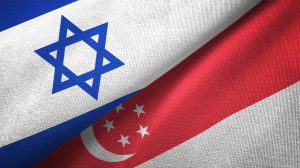The Facebook post surfaced on March 24, the 14th day of Ramadan. Sent from the official account of the Embassy of Israel in Singapore, the message stated that the Quran refers to Israel 43 times but does not mention Palestine “even once.”
Singapore denounced the post as “completely unacceptable.”
The Minister for Home Affairs called the comment “wrong at many levels” but stressed that Singapore’s primary concern was public safety. Anger over “insensitive” comments could “spill over into the physical realm,” warned K. Shanmugam. Nearly 16 percent of the city-state’s population is Muslim.
The Israeli embassy deleted the post and issued a statement promising to uphold Singapore’s commitment to religious harmony.
The home minister’s rebuke was the latest in a series of remarks by top officials in Singapore urging Israel to exercise restraint during the ongoing military operations in Gaza.
A few days before the Facebook incident, Vivian Balakrishnan said, “We need to tell our Israeli friends when we have a divergence.” The Minister for Foreign Affairs made his remarks during a 10-day visit to the Middle East.
Balakrishnan described his discussions with Israel’s leadership as “candid, frank, sometimes even brutal.” He told Prime Minister Benjamin Netanyahu that from Singapore’s perspective, the military response in Gaza had “gone too far.”
Singapore’s foreign minister also offered words of support. He condemned the October 7 attack by Hamas as a “flagrant, heinous act of terror” and called for the immediate release of hostages.
Treading the middle ground on the Israel-Palestine conflict is familiar territory for the island nation. Singapore’s friendship with Israel, dating back to the mid-1960s, has long been a bone of contention with Malaysia and Indonesia. Singapore’s Muslim-majority neighbors have kept Israel at arm’s length and do not maintain a diplomatic presence in Tel Aviv.
The “special relationship” with Israel started as a defense partnership. In 1965, newly independent Singapore had only two infantry battalions and no air force. Founding Prime Minister Lee Kuan Yew reached out to Israel, another small nation forced to build a military from scratch. The Singapore army is based on the Israeli model of a conscription-based military that can mobilize citizens at short notice.
“As a newly-independent state with limited resources other than our people and sheer grit to rely on, Singapore needed Israel’s help to build up our armed forces,” wrote Winston Choo, a former army chief who later served as non-resident ambassador to Israel.
Singapore did not initially acknowledge the military collaboration as the Israel-Palestine conflict was a sensitive topic for Southeast Asian Muslims. Details of Israel’s covert involvement surfaced three decades later when Lee Kuan Yew published his 1998 memoir, “The Singapore Story.”
Over the last decade, trade between the two countries has flourished and reportedly crossed $1 billion in 2022. Singapore reached another milestone that year by upgrading its diplomatic presence in Tel Aviv from an honorary consulate to an embassy with a resident ambassador.
When Ian Mak presented his credentials to President Isaac Herzog on December 19, an Israeli diplomat described the occasion as “history in the making.” But the ambassador’s handshake with Israel’s president as the military operation was underway in Gaza, created an awkward photo op for Singapore.
In a parliamentary debate, Singapore’s foreign minister called the timing of the diplomatic appointment “fortuitous or ‘unfortuitous,’ depending on your point of view.” But he urged legislators to refocus their attention on the domestic front because “foreign policy begins at home.” Balakrishnan warned that polarization along religious lines posed an existential threat to Singapore’s multicultural society “in the heart of Southeast Asia.”
Prime Minister Lee Hsien Loong has also adopted a more neutral stance on the Middle East after the October 7 attack. Speaking at a People’s Action Party convention last November, he reminded the audience that the Israel-Palestine conflict is “not our quarrel.”
Singapore’s leadership is increasingly leaning into the phrase “friend to all and an enemy to none.”

































